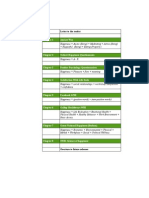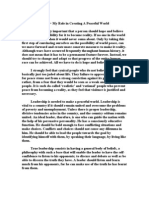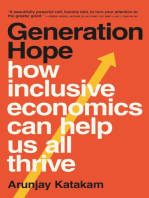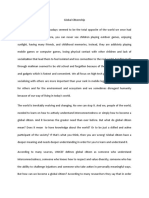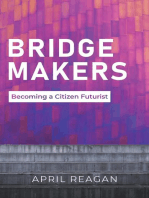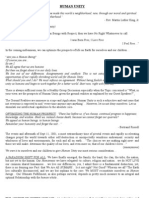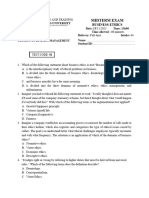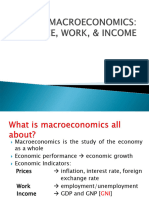Bhutan King Speech
Bhutan King Speech
Uploaded by
aliasheshCopyright:
Available Formats
Bhutan King Speech
Bhutan King Speech
Uploaded by
aliasheshOriginal Description:
Copyright
Available Formats
Share this document
Did you find this document useful?
Is this content inappropriate?
Copyright:
Available Formats
Bhutan King Speech
Bhutan King Speech
Uploaded by
aliasheshCopyright:
Available Formats
The Madhavrao Scindia Memorial Lecture Delivered by His Majesty The King of Bhutan:
During my year at the National Defence College in Delhi, I came to value my visits to this auditorium as a place, at which one would hear words of wisdom delivered, often very memorably. I always thought of myself as the humble listener. Even though I am here today as a Head of State, this auditorium fills me with the same reluctance to speak I wish I was here to listen. I know that there are others present and others who have preceded me on this platform with far greater experience in leadership and with much greater achievements behind them. And then there are those of you who are poised on the brink of remarkable careers in the service of a great nation and people. I feel humbled in your presence. But I accept this responsibility because I represent a small nation the Kingdom of Bhutan and her citizens who, I believe, possess a unique experience from which they may offer through me something of value to the people of the world. So when Shri Jyotiraditya called with the invitation to be here I said Yes immediately as friends and out of great respect for the late Shri Madhavrao Scindia. This is indeed a wonderful forum in which to represent Bhutan. Thank you all for this opportunity. The title for my talk today is Changing World and Timeless Values the reason for such a title is that I had always wanted to think more deeply about how one might find an enduring place for simple human values in a world that is becoming unrecognizable
from one generation to the next. And how, sadly, while the need for values is stronger and more urgent than ever, the climate in which they would flourish grows more and more unfriendly. Alas, I am neither an academic, spiritual leader nor philosopher and I can only bring to this important topic my own personal thoughts. Many years ago, I told a group of students at a convocation ceremony in Canada that The power of the individual has never been greater than at this time in history and yet, the helplessness of the less fortunate may never have been as distressing either - in an age of plenty. Modernization and political change have raised the individuals freedom, but it has also led to a less desirable and unconscious freeing of the individual from his obligations to society and the greater good. An inherent sense of values has gone missing. I told them, I felt that while young people leaving university must be armed with degrees, it is more important that they be endowed with a strong sense of values that bring meaning and purpose in their lives as well as stable, bright futures ahead for society and the world. This is the theme of my conversation with you today. I truly believe that the only way to observe the most important things in life and in this world is by putting them through the lens of Simplicity. You must break everything down to its fundamentals, break it down to basic human instances. For in the end, no matter what country we may be from, we are human beings no matter what our cultures and beliefs may be, we share the same needs and abide by the same fundamental values.
In fact, it may be these very values that could guide us, through the great problems, even those of environmental degradation, terrorism and world poverty. Perhaps the first of these values is the sense of a shared planet. This is a world that is shared not between governments and nations but among us, the people. It may sound idealistic but this is a natural and practical way of approaching things that seem intractable and inflexible no matter how big the problem. The image of a shared planet must always be present in our minds and especially in the minds of those who are in positions of leadership. I dont claim to be an expert on global issues but it can only help in the search for a solution if we remember that this planet must be passed on to our future generations and to other living beings. Isnt it natural that every individual will seek to enhance his inheritance and pass it on to his own children? Shouldnt it be even more natural, then to assume that our generation every generation that inherits this earth must pass it on stronger and more secure to the next? Without this simple guiding value, that our world is
shared among us and our future generations, we will continue robbing our planet and our children. Is it wrong to assume that a huge step to finding solutions to global problems, and averting future crises, will be taken if we can think in the spirit of community and fraternity, not as individual entities? When we accept that this is a world of people all alike, of families all alike, of communities all alike - of countries facing the same challenges of human beings ultimately seeking the same thing then we will truly be in a position to foster well being, security and happiness.
In this interconnected world no nation stands alone. How could it? Disease, poverty, strife these afflictions do not understand national boundaries the internet age and the free and fast flow of information shows us daily, the incongruity, injustice and inhumanity of a world of vast inequality. Individual or even national success is a ship that cannot carry everyone together to the same place at the same time. Rich nations must stop to be mindful of the poorer ones left behind. Successful people must stop to remember those who didnt make it. No nation today can stand alone in achievement. Time is slowly telling us that there can be no lasting individual success without success as a community and there cannot be lasting national progress and success if it does not fit into a future of global peace, harmony and equality. The world must progress together or fail together. I believe that any real and lasting solution to global issues can only come through a universal wave of human empathy, desire and passion for the common good. Global problems are problems that face mankind and our planet. Governments might mediate problems at the global level, but its effects are felt by people, like you and me. While we know it is an accepted process that
governments and large institutions debate the issues, negotiate and bargain on the concessions to be made we tend to forget that in protecting our own constituencies, we jeopardize the world and thus ourselves and our own future generations. Global problems cannot be solved by protecting local self-interest.
As I said before, I risk sounding idealistic but the fact is that I believe it is only when we are willing to bear the embarrassment of being a little innocent that we will be able to say Let us place the interest of humanity, not national populations and constituencies, above all else. Let us take political risks and strong decisions in addressing the needs of humanity. The answer to global problems will come closer at hand when we grasp that universal simplicity that sense of a shared planet and a shared fate for those who walk on it. We need shared human endeavour not just negotiated change.
I have been inspired in the way I look at things by Bhutans development philosophy of Gross National Happiness (GNH) and its pioneer, my father His Majesty Jigme Singye Wangchuck. Today, GNH has come to mean so many things to so many people but to me it signifies simply - Development with Values. We strive for the benefits of economic growth and modernization while ensuring that in our drive to acquire greater status and wealth we do not forget to nurture that which makes us happy to be Bhutanese. Is it our strong family structure? Our culture and traditions? Our pristine environment? Our respect for community and country? Our desire for a peaceful coexistence with other nations? If so, then the duty of our government must be to ensure that these invaluable elements contributing to the happiness and wellbeing of our people are nurtured and protected. Our government must be human.
Thus, for my nation, today GNH is the bridge between the fundamental values of Kindness, Equality and Humanity and the necessary pursuit of economic growth. GNH acts as our National Conscience guiding us towards making wise decisions for a better future. It ensures that no matter what our nation may seek to achieve, the human dimension, the individuals place in the nation, is never forgotten. It is a constant reminder that we must strive for a caring leadership so that as the world and country changes, as our nations goals change, our foremost priority will always remain the happiness and wellbeing of our people including the generations to come after us. Thus, that is why I say GNH is Development guided by human Values. The greatness of the concept lies in the simplicity of its origin. For, it is born from nothing other than one person King Jigme Singye Wangchucks - passionate desire to serve a country and people from virtuous human endeavour. I am confident that the noble goal of Gross National Happiness will be key to Bhutans success in maintaining our unity and harmony indeed our character as a nation.
Another factor that has always played a central role in our success without which we would certainly not be where we are today is Indias friendship. Some say Bhutan was wise to seek strong bilateral relations with India. Yes, after all whether we speak about our socio-economic progress or our recent transition to
democracy, India has been our steadfast partner and friend.
But I feel that the true wisdom lies in the fact that we sought and continue to seek true friendship with India. I see the roots of our ties in the difficult yet most personal and intimate journey of Pandit Nehru to Bhutan in 1958 on the invitation of my grandfather. And how, after all these years and such a great widening of our cooperation - our friendship remains as intimate and strong as it was then - between two very great men. It is said that a mans most important relationships are formed in the early years of life. I have always said that this saying holds so true for India and Bhutan. One country while still radiating joy and warmth from the attainment of Independence ushered the other into the realm of modernization. Since then, our relations have grown strong, vibrant, and dynamic. From religious and cultural links to political and economic cooperation - today our ties encompass a great diversity of areas and issues on which we work closely together in each others best interests. The strength of our friendship is even more striking when viewed in the context of the profound changes that have taken place in the world in the last few decades. With modernization our peoples have a greater awareness of the world beyond our region. And though awakened to new realities and experiences, our friendship has evolved, as only true friendship can, over time. Despite the vast difference in size and population, our friendship has been constant because of the pillars of trust and understanding on which we have founded it. Our relationship stands as a model of partnership and cooperation.
If we view India Bhutan Friendship - through the prism of simplicity the perspective of fundamental human values, Indo-Bhutan friendship began as a bond between two men two leaders and that our best future lies in an unaltering bond between our two peoples.
Finally, let me say something about the role Values play in my life as an individual and as someone called upon to assume a position of leadership. As a young person, I thought a great deal about the future awaiting me. I thought about the question of how good Kings and great leaders come about what factors bring them into being. We see that world history speaks of leaders with great foresight and vision leaders for troubled times leaders for young nations and ancient empires. Leaders in different fields. All kinds of leaders religious, economic, political. After many years of observing my father, working with government, touring the country, living in the villages and meeting the people , I learned that you dont just become a leader for a prescribed and planned situation you have to offer leadership whatever the circumstances. Now, having assumed the duties of Kingship of this small Himalayan nation in the midst of a globalizing world that changes in an instant, it is even more clear that there is no way to foresee the circumstances and plan for leadership in such a world. So my guiding principle has been born and nurtured on the simple instinct that in order to do the job I have been given as best as I can first and foremost, I must strive to be a good human being.
So while the wider vision is crucial to me it is more important for me as a King whose aspirations are lodged within those of my country and people to be able to crystallize that vision to fulfill the ultimate aspirations of the people in the form of simple daily acts carried out from moment to moment. I take each day as it comes. If someone in a village has something to tell me, I stop and listen. If an old mans house must be rebuilt after a natural disaster, I try and stay there to see it through. It may take an extra few minutes or months but it must be done. Not only is it the duty of a good human being, but each moment, each action is to me, a building block that will one day take shape in the wider vision. Besides, its all very well to have a vision that stretches to the top of the peaks, but unless you are walking a little up the hill everyday, you will never get there. That is why today, I do not have my eyes on the rewards or legacy that accrue to the work of leadership. I prefer to focus on the immediate, most pressing needs of people not just in Bhutan, people anywhere. Every day, as an individual, I aim at being a good son, brother, friend a good human being. As a King, I always find myself humbled by the duty to serve a country and people. So I strive to do so in a spirit of Kindness, Integrity and Equality. I always seek to discern what is right what is good for the country and the people every moment of the day. These Values mean everything to me and they will always define me, and my duty to the country. I cannot imagine living in a world where ones duty is only to oneself or to ones family or country. We must build from these
true and intimate relationships outwards and upwards to the nobler duty to the greater world and to peace, prosperity and happiness that is global. In conclusion, after this long speech, all I have said is that there is only one starting point to resolve any problem big or small that is ones self. Each one of us must embark upon our personal journey towards the timeless goal of living a good life being a good human being even as we tackle the worlds largest problems. Thank you for being here to listen to me today.
You might also like
- The Atlas of Happiness - Helen RussellDocument283 pagesThe Atlas of Happiness - Helen Russellcoccolinobianco10% (1)
- Letter To The ReaderDocument42 pagesLetter To The ReaderFrank Ra100% (2)
- My Young People, You Inspire Me To WriteDocument4 pagesMy Young People, You Inspire Me To WriteHuda shahid KhanNo ratings yet
- Article On Service To HumanityDocument4 pagesArticle On Service To HumanityanshulNo ratings yet
- Aida EssayDocument3 pagesAida Essaydiela96No ratings yet
- I, the Citizen: Unraveling the Power of Citizen EngagementFrom EverandI, the Citizen: Unraveling the Power of Citizen EngagementNo ratings yet
- The Contemporaneous India: Account by an Unknown HindustaniFrom EverandThe Contemporaneous India: Account by an Unknown HindustaniRating: 4 out of 5 stars4/5 (1)
- Activity 7 TCW (300 To 500 Words Per Question) 1. What Is in Your Own View About The Ethical Obligation of A Global Citizen?Document2 pagesActivity 7 TCW (300 To 500 Words Per Question) 1. What Is in Your Own View About The Ethical Obligation of A Global Citizen?Persephone KoreNo ratings yet
- Q A Part 1Document5 pagesQ A Part 1Heart Marie LañojanNo ratings yet
- I Have The Power: Unlocking Your Potential to Change the WorldFrom EverandI Have The Power: Unlocking Your Potential to Change the WorldNo ratings yet
- Be The Change You Want To See in Croatia: EssayDocument4 pagesBe The Change You Want To See in Croatia: EssayJustin GarciaNo ratings yet
- Sample Speech 1Document1 pageSample Speech 1Gian SeptimoNo ratings yet
- AYIMUN MOTLETDocument1 pageAYIMUN MOTLETcintanajwaputriairwansyah2005No ratings yet
- Why Are You Passionate About The First Priority SDG Highlighted by You As A Priority?Document9 pagesWhy Are You Passionate About The First Priority SDG Highlighted by You As A Priority?sü RåyåNo ratings yet
- Queens Commonwealth Essay 2023Document3 pagesQueens Commonwealth Essay 2023Kindred Spirits TeaNo ratings yet
- Generation Hope: How Inclusive Economics Can Help Us All ThriveFrom EverandGeneration Hope: How Inclusive Economics Can Help Us All ThriveNo ratings yet
- Activity 4.2 Reflective EssayDocument4 pagesActivity 4.2 Reflective EssayAlvin QuintanaNo ratings yet
- Essay About UNITYDocument2 pagesEssay About UNITYJhon BautistaNo ratings yet
- DocumentDocument10 pagesDocumentNaruto Uzumaki67% (3)
- Global Citizens-WPS OfficeDocument5 pagesGlobal Citizens-WPS OfficeAubrey BorjaNo ratings yet
- FOBN UNGA Special Issue September 2024 Final VersionDocument40 pagesFOBN UNGA Special Issue September 2024 Final VersionTopuNo ratings yet
- SpeechDocument4 pagesSpeechilmifachri55No ratings yet
- Zeynep Timmester Development PaperDocument7 pagesZeynep Timmester Development Paperapi-237614986No ratings yet
- SP 250112Document6 pagesSP 250112bhupendra SinghNo ratings yet
- Leadership for a Fractured World: How to Cross Boundaries, Build Bridges, and Lead ChangeFrom EverandLeadership for a Fractured World: How to Cross Boundaries, Build Bridges, and Lead ChangeNo ratings yet
- Pangeran SpeechDocument2 pagesPangeran SpeechJackson JayaNo ratings yet
- Legal Profession Finals2Document6 pagesLegal Profession Finals2MRose SerranoNo ratings yet
- Global Citizenship!Document3 pagesGlobal Citizenship!Lizi GabidzashviliNo ratings yet
- Gec 3a Chapter 14Document4 pagesGec 3a Chapter 14jessicaalonzo63No ratings yet
- What Is BeautyDocument4 pagesWhat Is BeautyKimberly Tamfolok PorrasNo ratings yet
- Future Plan As A Global CitizenDocument3 pagesFuture Plan As A Global CitizenReda ArifNo ratings yet
- Newsletter 100Document8 pagesNewsletter 100hawkinsnischalNo ratings yet
- Miss Negros 2024Document13 pagesMiss Negros 2024Heart Marie LañojanNo ratings yet
- The Journey: The Start of a Conversation and a Guide Toward Our Future ProsperityFrom EverandThe Journey: The Start of a Conversation and a Guide Toward Our Future ProsperityNo ratings yet
- Values Education For Human Solidarity-QuisumbingDocument4 pagesValues Education For Human Solidarity-QuisumbingFerhat KazkonduNo ratings yet
- Human Final)Document10 pagesHuman Final)NILSCRIBNo ratings yet
- Public Speaking Final ExamDocument4 pagesPublic Speaking Final Exampokemonkute111No ratings yet
- Everyday Ambassador: Make a Difference by Connecting in a Disconnected WorldFrom EverandEveryday Ambassador: Make a Difference by Connecting in a Disconnected WorldRating: 4 out of 5 stars4/5 (1)
- On Human Dignity: The Person?"Document2 pagesOn Human Dignity: The Person?"Danny CastroNo ratings yet
- NCC ProjectDocument18 pagesNCC ProjectKirti MinochaNo ratings yet
- The Good Country Equation: How We Can Repair the World in One GenerationFrom EverandThe Good Country Equation: How We Can Repair the World in One GenerationNo ratings yet
- Competencies and Activities in English 10Document8 pagesCompetencies and Activities in English 10Erma GenerosoNo ratings yet
- To My Mum and Dad Yetunde and AhmedDocument51 pagesTo My Mum and Dad Yetunde and AhmedSadiq SalawudeenNo ratings yet
- Azande of South Sudan Principle of LifeDocument31 pagesAzande of South Sudan Principle of LifeWanga BenNo ratings yet
- 6 7 1Document1 page6 7 1Sarah TributanteNo ratings yet
- Sample PT by ToraynoDocument8 pagesSample PT by ToraynoMichael Tarcis SalcedoNo ratings yet
- Blueprint For A New Nation - Introduction - v2Document4 pagesBlueprint For A New Nation - Introduction - v2thomasfannNo ratings yet
- Motivational LetterDocument2 pagesMotivational LetterMaria Agustin TaolinNo ratings yet
- EssayDocument3 pagesEssaySimran KalraNo ratings yet
- Global Citizenship EssayDocument11 pagesGlobal Citizenship Essayapi-32136339367% (3)
- Developing A Person As A Responsible Global CitizenDocument2 pagesDeveloping A Person As A Responsible Global CitizenJesselyn Cristo TablizoNo ratings yet
- Building A Better World: Partnering With Youth: Submitted By: Manika Gandhi CSE (2 Year)Document7 pagesBuilding A Better World: Partnering With Youth: Submitted By: Manika Gandhi CSE (2 Year)kuberNo ratings yet
- Commonwealth EssayDocument2 pagesCommonwealth Essaythiirtesh ritz thiirteshNo ratings yet
- Lesson 15 Global CitizenshipDocument16 pagesLesson 15 Global CitizenshipAndrei Marquin AquinoNo ratings yet
- Nationalism - Rabindranath TagoreDocument9 pagesNationalism - Rabindranath TagorerrdasguptaNo ratings yet
- How To Cultivate NationalismDocument4 pagesHow To Cultivate NationalismSantosh Kumar MamgainNo ratings yet
- CCC CC C CC CCCCCCCC CCCCCC CC CCCC CCCCCCC CCDocument3 pagesCCC CC C CC CCCCCCCC CCCCCC CC CCCC CCCCCCC CCRaza AleNo ratings yet
- Good Society Framework PWJDocument9 pagesGood Society Framework PWJerzaNo ratings yet
- INDIAN ECONOMY NotesDocument72 pagesINDIAN ECONOMY NotesVrinda ChaturvediNo ratings yet
- Ministry OF Works AND Human SettlementDocument20 pagesMinistry OF Works AND Human Settlementaman pulamiNo ratings yet
- Boardroom Dynamics - NotesDocument252 pagesBoardroom Dynamics - NotesDanielNo ratings yet
- Ed AssignmentDocument1 pageEd AssignmentIqra KhanNo ratings yet
- World's Happiest Countries - CNNGo - 2011Document5 pagesWorld's Happiest Countries - CNNGo - 2011Nisrina Nadhifah RahmanNo ratings yet
- READINGhhDocument53 pagesREADINGhhrishibansaladvo0227No ratings yet
- Đề TN BEDocument9 pagesĐề TN BEQuyền ĐinhNo ratings yet
- Buddhist Economics An OverviewDocument24 pagesBuddhist Economics An OverviewYuluoyan ChenNo ratings yet
- The BEST Sawmills in Asia - PDF From Wood-Mizer - SmallDocument21 pagesThe BEST Sawmills in Asia - PDF From Wood-Mizer - Smalljhon marboenNo ratings yet
- Gross Domestic Product-An Analysis: ContentsDocument4 pagesGross Domestic Product-An Analysis: ContentsSumeet ChoudharyNo ratings yet
- StrategiesforTeachingPhysics AnActionResearchDocument14 pagesStrategiesforTeachingPhysics AnActionResearchDevika ManiNo ratings yet
- World Happiness ReportDocument170 pagesWorld Happiness ReportmrdanNo ratings yet
- Life Pre-Intermediate Writing Worksheet Units 1&2Document6 pagesLife Pre-Intermediate Writing Worksheet Units 1&2SabrinaNo ratings yet
- World Happiness IndexDocument11 pagesWorld Happiness IndexLatihanUjian OnlineNo ratings yet
- BAEC 12 Block 01Document42 pagesBAEC 12 Block 01Padma GaigouriaNo ratings yet
- GNH - Cultural Diversity and Resilience in BhutanDocument4 pagesGNH - Cultural Diversity and Resilience in BhutanIntegrated Intelligent ResearchNo ratings yet
- Basic Macro Concepts - Philippines RevisedDocument126 pagesBasic Macro Concepts - Philippines RevisedMelissa SantosNo ratings yet
- SENORA Bangladesh PDFDocument33 pagesSENORA Bangladesh PDFNishat NabilaNo ratings yet
- Thai Health 2007Document132 pagesThai Health 2007thaihealthNo ratings yet
- 29791202088419cb 1 National Income AccountingDocument16 pages29791202088419cb 1 National Income AccountingSonakshi PundirNo ratings yet
- 9 Domains PDFDocument12 pages9 Domains PDFschylesNo ratings yet
- Measuring HappinessDocument15 pagesMeasuring HappinessVikas ReddyNo ratings yet
- Bhutan Green EconomyDocument54 pagesBhutan Green EconomyMyke AngNo ratings yet
- Demystifying A Himalayan TragedyDocument11 pagesDemystifying A Himalayan TragedyAmit Kumar100% (1)
- International Day of Happiness: Colegio Cundinamarca IedDocument8 pagesInternational Day of Happiness: Colegio Cundinamarca IedJUANA VALENTINA REYES RODRIGUEZNo ratings yet
- Bhutan King SpeechDocument10 pagesBhutan King SpeechaliasheshNo ratings yet
- A Splendid Isolation: Lessons On Happiness From The Kingdom of BhutanDocument52 pagesA Splendid Isolation: Lessons On Happiness From The Kingdom of BhutanMadeline DrexlerNo ratings yet


